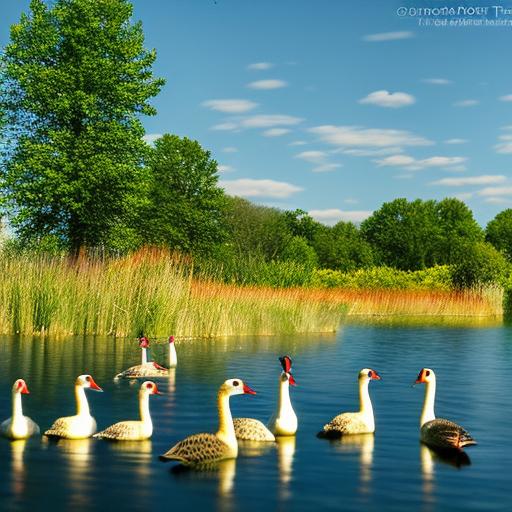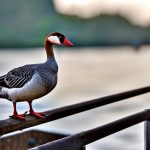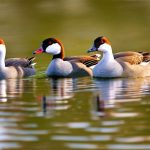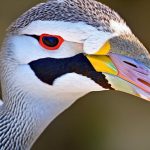Geese are a common sight around ponds, lakes, and other bodies of water. They are known for their distinctive honking sound and their graceful flight patterns. Geese are social birds that often gather in large flocks, especially during migration seasons. Ponds provide an ideal habitat for geese, as they offer a source of water, food, and shelter.
Maintaining a healthy pond ecosystem is important for both the geese and the surrounding environment. Ponds provide geese with a place to rest, feed, and breed. However, an overabundance of geese can lead to several issues, including damage to vegetation, shoreline erosion, and health risks associated with their droppings. It is important to find a balance that allows geese to coexist with other wildlife while also protecting the pond ecosystem.
Key Takeaways
- Geese can be a common sight on ponds, but their presence can cause problems.
- Understanding geese behavior can help in finding effective deterrents to keep them away from ponds.
- Geese can negatively impact ponds by causing water pollution and damaging vegetation.
- Physical, visual, audio, natural, and repellent deterrents can be used to prevent geese from landing on ponds.
- Preventing geese from nesting on ponds can be achieved by removing nesting materials and using decoys.
Understanding Geese Behavior around Ponds
Geese have specific mating and nesting habits that contribute to their presence around ponds. They typically mate for life and return to the same nesting site each year. Geese build nests on the ground near water, using grasses and other vegetation. They are protective of their nests and can become aggressive if they feel threatened.
When it comes to feeding patterns, geese are herbivores and prefer to eat grasses, aquatic plants, and grains. Ponds provide an abundant food source for geese, as they can graze on the vegetation that grows in and around the water. The presence of geese can also attract other waterfowl species, creating a diverse ecosystem.
The Negative Impact of Geese on Ponds
While geese play an important role in the ecosystem, their presence can have negative effects on ponds. One of the main issues is damage to pond vegetation. Geese feed by pulling up plants from the roots, which can lead to the destruction of aquatic vegetation. This can disrupt the balance of the pond ecosystem and impact other wildlife that rely on these plants for food and shelter.
Another concern is shoreline erosion. Geese often congregate near the water’s edge, which can lead to trampling and erosion of the shoreline. This can result in the loss of valuable habitat for other species and can also contribute to water quality issues.
Geese droppings can also pose health risks. Their droppings contain bacteria that can contaminate the water, making it unsafe for swimming or other recreational activities. In addition, the accumulation of droppings on walkways and picnic areas can create unsightly and unsanitary conditions.
Furthermore, the noise pollution caused by geese can be disruptive to both humans and other wildlife. Their constant honking can disturb the peace and tranquility of a pond environment, making it less enjoyable for visitors. It can also disrupt the nesting and feeding behaviors of other bird species.
Physical Deterrents to Keep Geese Away from Ponds
There are several physical deterrents that can be used to keep geese away from ponds. Fencing and netting options can be effective in preventing geese from accessing certain areas. A fence with small openings or a net placed over the water’s surface can create a barrier that geese cannot easily pass through.
Motion-activated sprinklers and water jets are another option. These devices use sensors to detect movement and then spray water in the direction of the geese. The sudden burst of water startles the geese and encourages them to leave the area.
Barriers and decoys can also be used to deter geese. Barriers such as low walls or hedges can create physical obstacles that prevent geese from entering certain areas. Decoys, such as fake predators or scarecrows, can also be effective in scaring geese away.
Visual Deterrents to Scare Geese from Ponds
Visual deterrents can be used to scare geese away from ponds. Reflective tape and balloons can be hung near the water’s edge to create movement and reflections that deter geese. The shiny surfaces and unpredictable movement can make geese feel uneasy and discourage them from landing.
Predator decoys and scarecrows can also be effective visual deterrents. These decoys mimic natural predators of geese, such as owls or coyotes. The presence of these decoys can create a sense of danger for the geese, causing them to avoid the area.
Laser pointers and flashing lights can also be used to scare geese away. The bright lights and laser beams can startle the geese and make them feel threatened. However, it is important to use these devices responsibly and avoid shining them directly into the eyes of the geese.
Audio Deterrents to Keep Geese off Ponds

Audio deterrents can be used to keep geese off ponds by creating sounds that are unpleasant or threatening to them. Ultrasonic devices emit high-frequency sounds that are inaudible to humans but can be irritating to geese. These devices can be placed near the water’s edge or in areas where geese tend to congregate.
Bird distress calls are another audio deterrent that can be effective in scaring geese away. These calls mimic the sounds of distressed birds, signaling danger to the geese and encouraging them to leave the area.
Wind chimes and bells can also be used as audio deterrents. The constant noise created by these devices can disrupt the peace and quiet that geese prefer, making the area less appealing to them.
Recorded sounds of predators, such as barking dogs or hissing snakes, can also be effective in scaring geese away. These sounds trigger a natural fear response in the geese, causing them to flee.
Natural Deterrents to Prevent Geese from Landing on Ponds
There are several natural deterrents that can be used to prevent geese from landing on ponds. Planting tall grasses and shrubs near the water’s edge can create a physical barrier that makes it difficult for geese to access the pond. These plants also provide cover for other wildlife and can enhance the overall aesthetics of the pond.
Installing floating islands and rafts can also deter geese from landing on ponds. These structures provide a safe haven for other bird species, such as ducks or herons, while making it difficult for geese to access the water.
Adding fish and turtles to the pond ecosystem can also help deter geese. Fish and turtles feed on the vegetation that geese prefer, reducing the available food source and making the pond less attractive to them.
Geese Repellents to Keep Them Away from Ponds
There are several repellents available that can be used to keep geese away from ponds. Chemical repellents and sprays can be applied to the vegetation around the pond to make it taste unpleasant to geese. These repellents are typically safe for other wildlife and do not harm the environment.
Homemade repellent solutions can also be effective in deterring geese. A mixture of water, vinegar, and dish soap can be sprayed on the vegetation to create an unpleasant taste and smell for geese.
Essential oils, such as peppermint or citrus, can also be used as natural repellents. These oils can be diluted with water and sprayed around the pond to create a scent that is unappealing to geese.
Tips for Preventing Geese from Nesting on Ponds
Preventing geese from nesting on ponds is an important step in controlling their population. Regularly removing nesting materials, such as grasses or twigs, can discourage geese from nesting in the area. It is important to remove these materials as soon as they are spotted to prevent geese from becoming attached to the site.
Installing nesting deterrents can also be effective in preventing geese from nesting on ponds. These deterrents can include wire barriers or spikes that make it difficult for geese to access potential nesting sites.
Encouraging geese to nest elsewhere is another option. Providing alternative nesting sites, such as nesting boxes or platforms, can redirect geese to more suitable locations.
Conclusion and Final Thoughts on Geese Control for Ponds
In conclusion, geese are a common sight around ponds and can contribute to a healthy ecosystem. However, their presence can also lead to several issues, including damage to vegetation, shoreline erosion, and health risks associated with their droppings. It is important to find a balance that allows geese to coexist with other wildlife while also protecting the pond ecosystem.
There are several effective methods for deterring geese from ponds, including physical, visual, audio, and natural deterrents. It is important to choose methods that are humane and eco-friendly, avoiding harm to the geese or other wildlife. Seeking professional help may be necessary in some cases, especially if the geese population becomes unmanageable.
By implementing these geese control methods and taking proactive measures to prevent nesting, pond owners can maintain a healthy and balanced ecosystem while also enjoying the beauty and tranquility of their ponds.
If you’re looking for ways to protect your pond from geese, you might also be interested in learning how to build a chicken coop that is both functional and spacious. Poultry Wizard offers a helpful article on “How Big Does a Coop Need to Be for a Chicken?” This informative guide provides insights into the ideal size requirements for a chicken coop, ensuring that your feathered friends have enough space to roam and thrive. Check out the article here to discover the secrets of creating a comfortable and secure home for your chickens.
FAQs
What are some common problems caused by geese on ponds?
Geese can cause a variety of problems on ponds, including water pollution, damage to pond vegetation, and aggression towards other wildlife.
What are some effective ways to keep geese off your pond?
Some effective ways to keep geese off your pond include using decoys, installing fencing or netting, using noise deterrents, and planting vegetation that geese dislike.
Are there any humane methods for keeping geese off your pond?
Yes, there are several humane methods for keeping geese off your pond, such as using visual deterrents, like reflective tape or balloons, and using natural repellents, like grape concentrate or hot pepper spray.
Is it legal to harm or kill geese to keep them off your pond?
No, it is not legal to harm or kill geese to keep them off your pond. Geese are protected under federal law, and harming or killing them can result in fines and other legal consequences.
What should I do if I have a persistent geese problem on my pond?
If you have a persistent geese problem on your pond, you should contact a wildlife control professional or your local wildlife agency for assistance. They can provide advice and assistance on how to safely and effectively manage the geese population on your pond.
Meet Walter, the feathered-friend fanatic of Florida! Nestled in the sunshine state, Walter struts through life with his feathered companions, clucking his way to happiness. With a coop that’s fancier than a five-star hotel, he’s the Don Juan of the chicken world. When he’s not teaching his hens to do the cha-cha, you’ll find him in a heated debate with his prized rooster, Sir Clucks-a-Lot. Walter’s poultry passion is no yolk; he’s the sunny-side-up guy you never knew you needed in your flock of friends!







